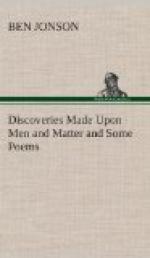Poetry, in this latter age, hath proved but a mean mistress to such as have wholly addicted themselves to her, or given their names up to her family. They who have but saluted her on the by, and now and then tendered their visits, she hath done much for, and advanced in the way of their own professions (both the law and the gospel) beyond all they could have hoped or done for themselves without her favour. Wherein she doth emulate the judicious but preposterous bounty of the time’s grandees, who accumulate all they can upon the parasite or fresh-man in their friendship; but think an old client or honest servant bound by his place to write and starve.
Indeed, the multitude commend writers as they do fencers or wrestlers, who if they come in robustiously and put for it with a deal of violence are received for the braver fellows; when many times their own rudeness is a cause of their disgrace, and a slight touch of their adversary gives all that boisterous force the foil. But in these things the unskilful are naturally deceived, and judging wholly by the bulk, think rude things greater than polished, and scattered more numerous than composed; nor think this only to be true in the sordid multitude, but the neater sort of our gallants; for all are the multitude, only they differ in clothes, not in judgment or understanding.
De Shakspeare nostrat.—Augustus in Hat.—I remember the players have often mentioned it as an honour to Shakspeare, that in his writing (whatsoever he penned) he never blotted out a line. My answer hath been, “Would he had blotted a thousand,” which they thought a malevolent speech. I had not told posterity this but for their ignorance who chose that circumstance to commend their friend by wherein he most faulted; and to justify mine own candour, for I loved the man, and do honour his memory on this side idolatry as much as any. He was, indeed, honest, and of an open and free nature, had an excellent phantasy, brave notions, and gentle expressions, wherein he flowed with that facility that sometimes it was necessary he should be stopped. “Sufflaminandus erat,” {47a} as Augustus said of Haterius. His wit was in his own power; would the rule of it had been so, too. Many times he fell into those things, could not escape laughter, as when he said in the person of Caesar, one speaking to him, “Caesar, thou dost me wrong.” He replied, “Caesar did never wrong but with just cause;” and such like, which were ridiculous. But he redeemed his vices with his virtues. There was ever more in him to be praised than to be pardoned.




